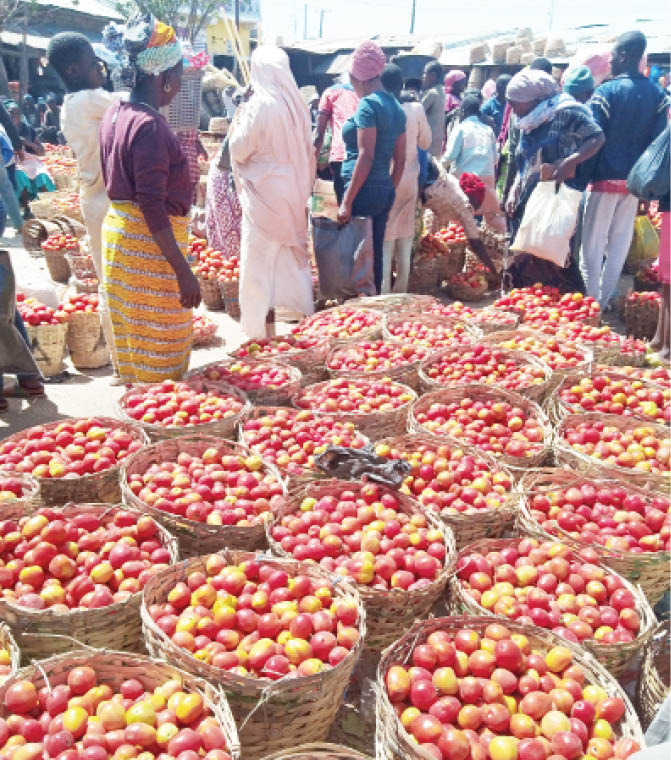After months of scarcity, tomato, potato supplies reduce market prices
Two months ago, the prices of tomato and Irish potatoes were far beyond what the ordinary consumers could afford. A basket of tomatoes in June went up to as much as N120,000 in the northern states and N140,000 in southern states. Like tomato, Irish potato too, had seen prices hitting the roof this year with […]

Baskets of tomatoes displayed for sale
Two months ago, the prices of tomato and Irish potatoes were far beyond what the ordinary consumers could afford.
A basket of tomatoes in June went up to as much as N120,000 in the northern states and N140,000 in southern states.
Like tomato, Irish potato too, had seen prices hitting the roof this year with a bag in the producing states sold as much as N180,000 and even higher in southern states.
The prices were hinged on shrinking supply sparked by heightened demand.
But now, markets across the producing areas on the plateau are seeing much better supplies.
These supplies have resulted in the prices coming down by more than 50 per cent.
Currently, a basket of tomatoes, which was sold between N100,000 and N140,000 now sold between N12,000 and N26,000 at the Darin Gada market, one of the biggest vegetable markets in Jos, the Plateau State capital. The same was noticed at the Building Materials market also in Jos.
These markets are now supply hubs for other markets across the country and many Nigerians are also tapping into the business with “waybills” now a major phenomenon in the business.
Yakubu Abwo told the reporter in Jos that the arrival of new tomato harvest has “dropped the prices.”
Mr Abwo said the medium sized basket (the farmers’ basket) which was sold at N45,000 few months ago is currently selling at even below N19,000 depending on the quality.
Mrs Joy Abbah and Juliana Danjuma who are buyers acknowledged that things are now better but the cost of transportation is the major blow that pushes prices up.
Mrs Juliana however believes farmers could not sell cheaper because of the battle with the cost of fertiliser and other agrochemicals.
For Irish potatoes, prices have been on the downward curve in the last few weeks. And the current hunger protests have seen more price crashes as buyers stay away from markets.
Husseini Abdullahi commonly called Baba Husseini who has been in the potato business since 1987 said this year has been a major challenge as prices tortured consumers.
Abdullahi who has been in the business for 37 years attributed the current prices to inflation, which also affected the cost of fertilisers with overbearing impacts on the general prices of agricultural products.
“Government needs to look into the cost of fertiliser carefully because it is the cost of fertilisers and agrochemicals that affect the prices of the vegetables. Some farmers bought fertiliser at N40,000, some at N50,000. This is a major problem.
“Before the Sallah fasting, we sold a bag for N150,000 but when the new harvest entered the market, we sold at N100,000, and today the price fluctuates between N40,000 and n52,000,” he said.
For many young people, the potato business is now a lucrative venture. Those who have built a network of “high class consumers” are reaping huge benefits.
Gabriel Kagonk is a young Nigerian who just finished his National Youth Service in Abuja. Back home in Jos, he supplies potatoes to the network he built during his days of NYSC at the Defence Headquarters in Abuja.
Gabriel now supplies potatoes not only to Abuja, but other parts of the country courtesy the network he built while serving in Abuja.
He said potatoes now put money both in the pocket of farmers and entrepreneurs who have identified markets.
Unlike others, Gabriel goes to the market to select the potatoes according to their sizes and quality – something that widens his customer base.
With prices now dropping as low as N48,000, he forecasted a further drop when more harvest hits the market, and that may happen in the next few months.
